by Gary Lord
Home - Genesis - 2007 - 2008 - 2009 - Early 2010 - Mid 2010 - Late 2010 - End 2010 - Early 2011 - Mid 2011 - Late 2011 - End 2011 - Early 2012 - Late 2012 - Early 2013- Late 2013 - 2014 - 2015 - Early 2016 - Late 2016 - 2017-19
Chapter Ten: Mid 2011
5 April 2011 marked one year since the release of Collateral Murder. Wikileaks was now seeking new media partners.


On 12 April WikiLeaks founder Julian Assange appeared on Australia’s primetime 7:30 Report. Host Leigh Sales suggested it must feel "unreal" to come from "sleeping rough on the streets of Melbourne" to global celebrity status.
"Well it does feel unreal," replied Assange, "because I’ve never slept rough on the streets of Melbourne."
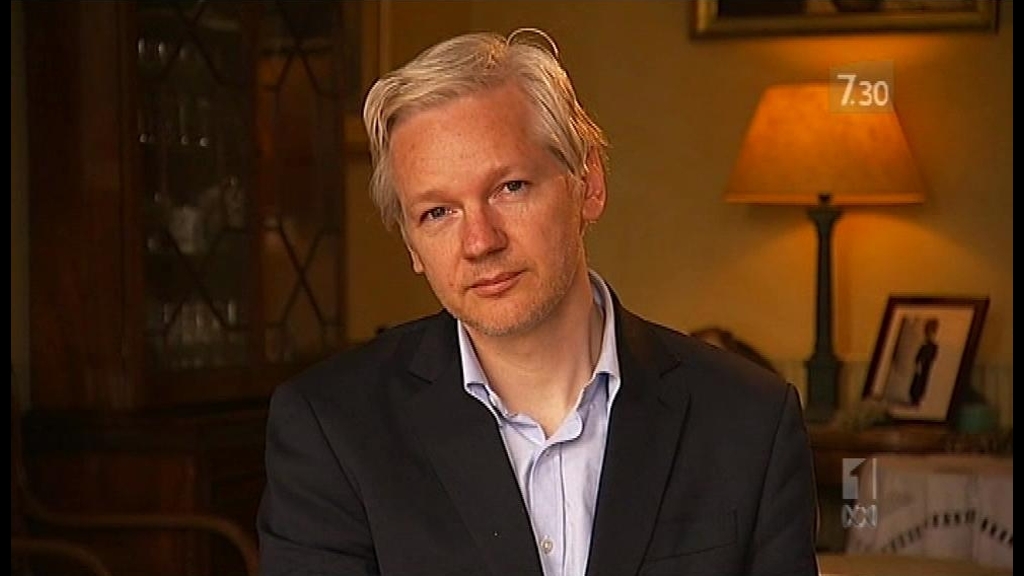
Leigh persisted with the negative questions:
"As I said before you’ve developed a very high profile and not everybody likes you, to put it gently. Do you fear for your life?"
"I have to disagree with that actually."
"You think everybody does like you?"
"No, not everybody, but these sorts of statements are in fact mischievous. I mean, if we look at Australian opinion polls, actually Wikileaks and myself have far greater popularity amongst the Australian population than sitting prime ministers have had in many years."
At a U.C. Berkeley debate on the same day, Julian Assange traded barbs via Skype with New York Times editor Bill Keller, who defended his decision to make Assange seem like an unhinged loser because it made his front page "bag lady" hit piece more readable.
"We weren’t writing an academic report - it was a story. That was information the reporter brought to me, and it was used as color."
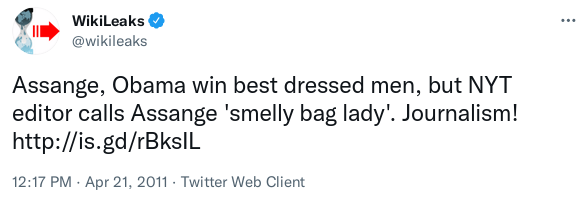
Assange noted that the Times had gone to extreme lengths to pretend there was no collaboration with WikiLeaks - even pressing for Wikileaks to publish documents before it did - in case they were accused of violating the Espionage Act.
"That’s why The New York Times is careful to say this was not a collaboration. What the Times is afraid of is that one man’s collaboration is another man’s conspiracy."
A week later Britain’s The Guardian was named UK Newspaper Of The Year for their work with WikiLeaks. Why didn’t the New York Times also win a Pulitzer for their coverage? According to WikiLeaks they were "too timid to nominate".
The Atlantic released a study in the same week showing that over half of the New York Times daily issues in the past twelve months had relied on stories related to WikiLeaks:
It now seems routine for WikiLeaks to serve as a source when it comes to American diplomacy, especially regarding the Middle East…
By our count, on 54 days so far this year, the paper’s reporters have relied on WikiLeaks documents as sources for their stories. Since April 25th is the 115th day of the year, that’s nearly half of all their issues this year. And just to be clear, we didn’t count stories that merely mentioned WikiLeaks or Julian Assange or Bradley Manning, only the ones that used documents from the site as a reporting source.

A Google Earth visualisation at the time showed how WikiLeaks mirror sites had spread across the globe:
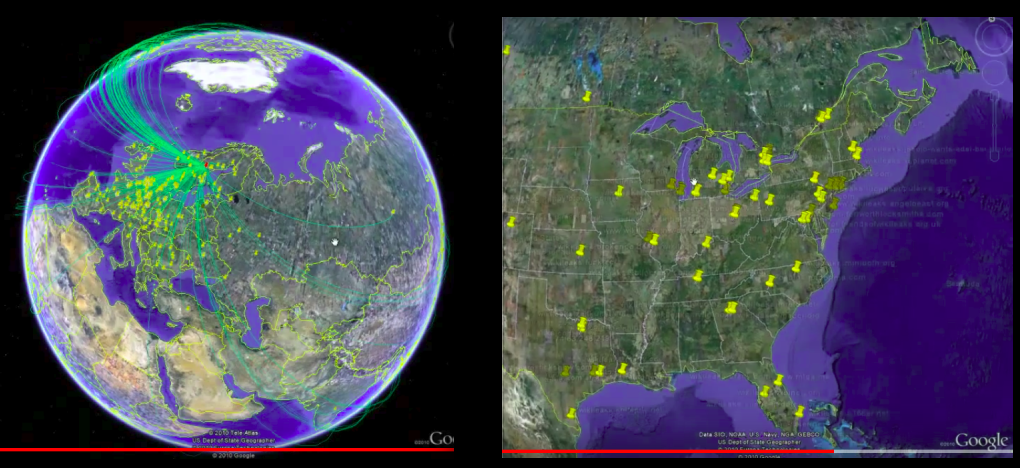
A new poll also showed overwhelming public support for Assange and WikiLeaks around the world.
A 24-country poll found that most people believe WikiLeaks co-founder Julian Assange is not a criminal and should not be charged by the U.S. government for releasing thousands of secret U.S. documents. The poll by Ipsos found 79 percent of people were aware of WikiLeaks and two-thirds of those believed Assange should not be charged and three-quarters supported the group’s bid to make public secret government or corporate documents.
U.S. respondents had a far more critical view, with 81 percent aware of WikiLeaks and 69 percent of those believing Assange should be charged and 61 percent opposing WikiLeaks' mission.
The countries found least likely to support legal action against Assange by the U.S. government were South Africa, Germany, Russia and Argentina, while the highest support was in the United States, South Korea, Britain, India and Indonesia.
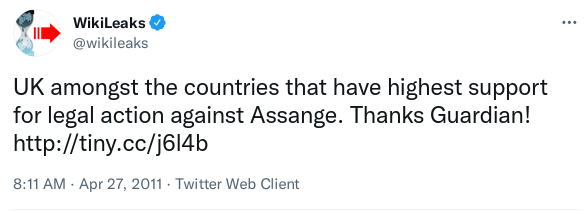
Another poll showed that just 48% of US citizens were familiar with the latest WikiLeaks release, but 52% of those people agreed that "the release of the information was good and made the government accountable". In addition, 73% of them "expressed a lack of confidence in governments’ ability to prevent future data leaks". Nevertheless, 64% of all those surveyed wanted WikiLeaks shut down.
And in Sweden, a poll of 9,000 lawyers found nearly a third of them agreed with Julian Assange’s criticisms of the Swedish legal system:
“We’re of the opinion that remand in Sweden is used in a way that many other states governed by the rule of law would find unfamiliar… The system is built up so that, in principal, the suspect doesn’t have any insight into the preliminary investigation."
*
On 21 April 2011 a group of disillusioned Obama voters paid $76,000 for tickets to a fundraiser where they cornered the President, sang him a song, and then asked about the treatment of Chelsea Manning. While Manning still had not been given a trial, the US Commander-In-Chief was caught on video saying that Manning "broke the law". Obama also said “it wasn’t the same thing” as what Daniel Ellsberg had done with the Pentagon Papers because the information “wasn’t classified in the same way.”
A White House spokesman later denied that Obama was "expressing a view as to the guilt or innocence of Pfc. Manning specifically". But clearly any chance of a fair trial had been prejudiced. Meanwhile both Manning and Assange were racing up the charts in TIME magazine’s annual "most influential people" poll.
*
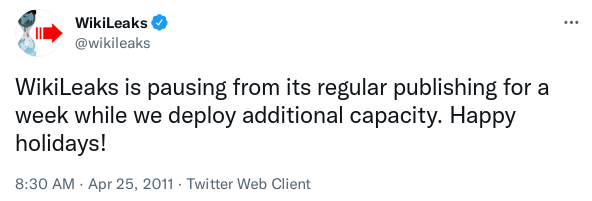
On 25 April WikiLeaks tweeted that they were taking a break from publishing. In fact, they were working with a new team of media partners, and seeking to scoop their old media partners with a big new release.
In December 2010 Reuters had reported that WikiLeaks had even more files from the USA’s Guantánamo Bay prison.
WikiLeaks founder Julian Assange, jailed in Britain this week, has told media contacts he has a large cache of U.S. government reports about inmates at the detention facility at Guantánamo Bay, Cuba… "He’s got the personal files of every prisoner in GITMO," said one person who was in contact with Assange earlier this year.
Who could that "one person" have been? How did they know about the files? And might they have been a little bit surprised later that day…?
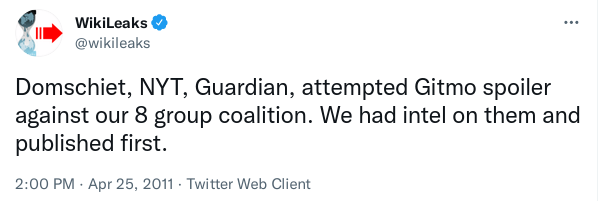
Gitmo Files
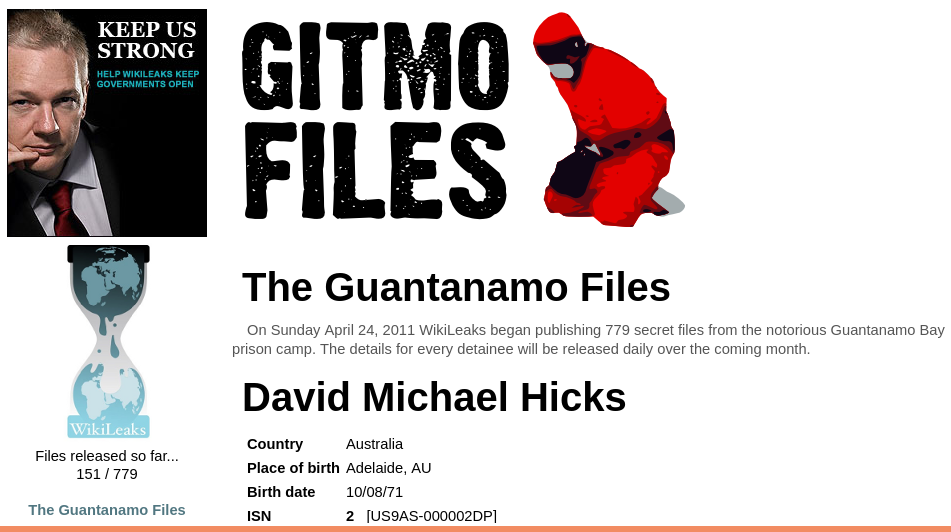
On 25 April 2011 WikiLeaks released "The Guantánamo Files".
In thousands of pages of documents dating from 2002 to 2008 and never seen before by members of the public or the media, the cases of the majority of the prisoners held at Guantánamo — 765 out of 779 in total — are described in detail in memoranda from JTF-GTMO, the Joint Task Force at Guantánamo Bay, to US Southern Command in Miami, Florida.
These memoranda, known as Detainee Assessment Briefs (DABs), contain JTF-GTMO’s recommendations about whether the prisoners in question should continue to be held, or should be released (transferred to their home governments, or to other governments). They consist of a wealth of important and previously undisclosed information, including health assessments, for example, and, in the cases of the majority of the 172 prisoners who are still held, photos (mostly for the first time ever).
They also include information on the first 201 prisoners released from the prison, between 2002 and 2004, which, unlike information on the rest of the prisoners (summaries of evidence and tribunal transcripts, released as the result of a lawsuit filed by media groups in 2006), has never been made public before. Most of these documents reveal accounts of incompetence familiar to those who have studied Guantánamo closely, with innocent men detained by mistake (or because the US was offering substantial bounties to its allies for al-Qaeda or Taliban suspects), and numerous insignificant Taliban conscripts from Afghanistan and Pakistan.
Beyond these previously unknown cases, the documents also reveal stories of the 399 other prisoners released from September 2004 to the present day, and of the seven men who have died at the prison.
The Gitmo Files provided further compelling evidence that the US military’s torture facility in Cuba had quickly degenerated into a cruel and pointless farce. Officials did not know why prisoners had been brought to them, or what to do with them. In 704 leaked documents assessed by the New York Times, the word "possibly" appeared 387 times, “unknown” 188 times and “deceptive” 85 times. The US Department of Defence had set up two committees at the prison who persistently argued with each other about how to classify prisoners and information. A handful of prisoners had turned informants under torture and were willing to say anything about other prisoners, leading to countless false accusations.
Some "high risk" prisoners had been released and quickly returned to terrorism, while there was no proof that many others were guilty of any crime at all. Some were only arrested because they wore a cheap old Casio model of watch which the US military claimed could be used as a timer for bombs. Many detainees were mentally unstable and prison conditions were only worsening their problems.
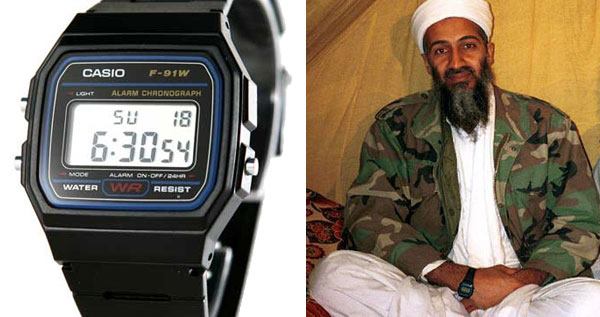
WikiLeaks’s partner Andy Worthington looked into the 14 missing Gitmo Files and found at least two of the ommissions were "overtly suspicious". One was an alleged bodyguard of Osama bin Laden who the USA had secretly allowed to go home to Morocco. Another was a self-described spy for the CIA in Kabul, and then in Guantánamo Bay, where he was treated like all the other prisoners but was never able to provide any useful information on them.
He said that his imprisonment at Bagram - where he was stripped, photographed naked and subjected to an anal probe - was the start of "the longest and most painful ordeal of his life," and that he "had no idea what he was getting into."
WikiLeaks warned readers to be careful about allegations contained in the files…
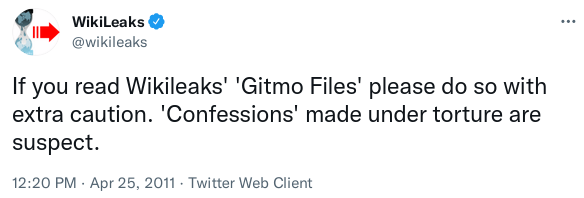
Sadly that was not enough to stop the Guardian rushing out another totally misleading front page story the next day. David Leigh was one of four Guardian journalists who reported that a former Gitmo detainee was an Al-Qaida assassin who also worked for Britain’s MI6 spy agency.
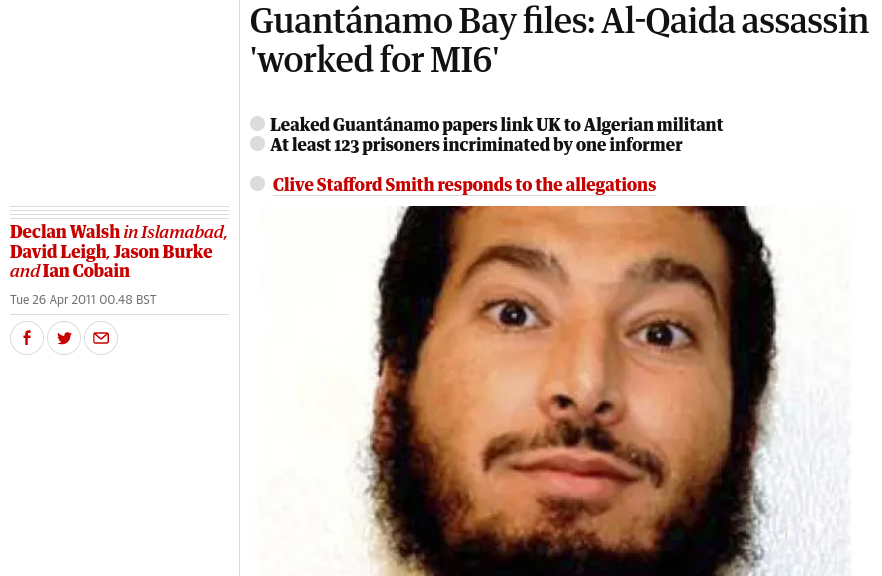
This prompted a quick response from Clive Stafford Smith, a lawyer for many Guantánamo detainees, who said the claims against his client were "based on ignorant gossip". The Guardian again simply added a link to their original story (above) rather than correcting their misleading text. Following his release from Guantánamo Bay, Adil Hadi bin Hamlili had been put on trial for terrorism in Algeria, but aquitted. Clive Stafford Smith said he was suffering from a psychotic disorder and other mental health problems as a result of his abuse in US custody.

The UK Telegraph was also criticised for creating a searchable database of prisoners which listed fifteen detainees who remained at the facility as "Terrorists" - even though they had not been given a fair trial. Despite these errors, UK media reports were generally more reliable that US accounts of the same Gitmo files. Glenn Greenwald compared the differing coverage and noted how US media organisations were reluctant to criticize their own government or military.
In sum, foreign newspapers highlight how these documents show U.S. actions to be so oppressive and unjust, while American newspapers downplayed that fact.
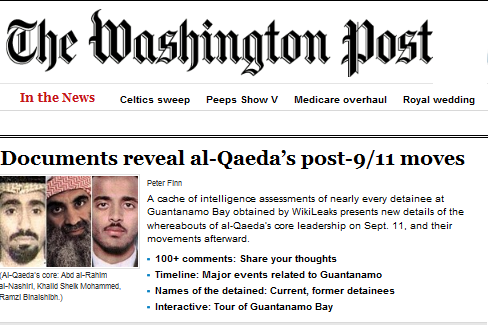
The impact of the release was somewhat deflated by public arguments about which media organisation had published them first. The Telegraph, which was working with WikiLeaks, posted the first story shortly before the New York Times and the Guardian, who nevertheless claimed an "exclusive" scoop.
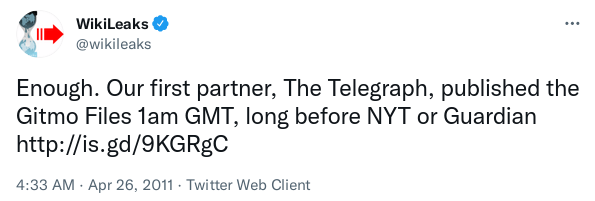
WikiLeaks also tweeted that their "enemies" had given Gitmo Files to a right wing Swedish tabloid, Expressen, and thus "scuppered" the investigation by their partner Aftonbladet.
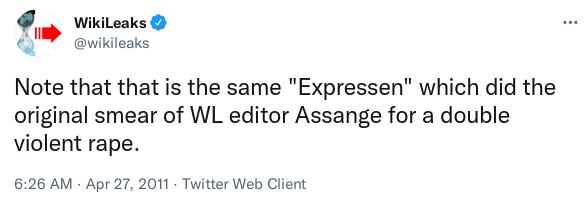
Pentagon spokesman Geoff Morrell denounced the publications but specifically blamed WikiLeaks for "illegally" obtaining the files (never mind the New York Times boasting that they published first and their source was not WikiLeaks):
“It is unfortunate that The New York Times and other news organizations have made the decision to publish numerous documents obtained illegally by WikiLeaks concerning the Guantánamo detention facility. These documents contain classified information about current and former GTMO detainees, and we strongly condemn the leaking of this sensitive information."
US Department of Defense attorneys representing detainees at Guantánamo Bay received an email warning them not to use the newly released files in habeas corpus proceedings.
In faraway Australia, Deputy Opposition Leader Julie Bishop had a bizzarely different take on the latest releases.
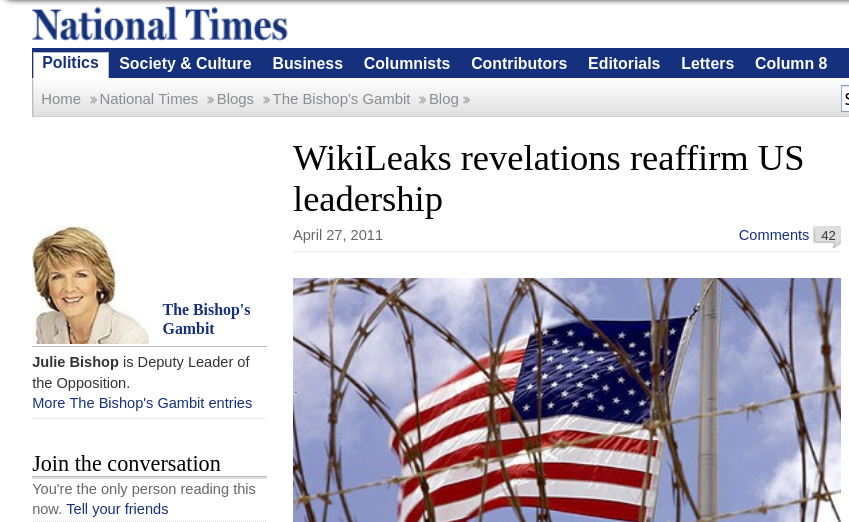
Her conclusion:
Rather than diminishing the role of the United States, the publication of its diplomatic cables via WikiLeaks has reinforced the importance of US leadership in dealing with global challenges.
WikiLeaks called the future Australian Foreign Minister "a national embarassment in pushing this fantasy". In fact the Australian government was again embarrassed by WikiLeaks: the Gitmo Files included two Australian citizens, David Hicks and Mamdouh Habib. Hicks' file was full of basic errors and wild, unproven claims used to justify his wrongful designation as a "worst of the worst" terrorist, while Habib’s file bolstered his complaint that he had been tortured in Egypt with Australian government knowledge: he later agreed a secret out-of-court settlement with the government (rumoured to be over $100,000 compensation) and a judge ordered his passport be returned.

Meanwhile the Australian parliament was debating new legislation that redefined the terms “foreign intelligence” and "foreign power" to include groups like WikiLeaks. It was just the start of an alarming tranche of new laws that steadily increased government surveillance powers at the cost of civil liberties.
*
On 2 May 2011, Al Qaeda leader Osama bin Laden was shot and killed by US Navy SEALs inside a private residential compound in the town of Abbottabad, in Pakistan’s mountainous northern region of Waziristan. His body was reportedly dumped at sea from a US military helicopter. US media celebrated his death with euphoric front pages.
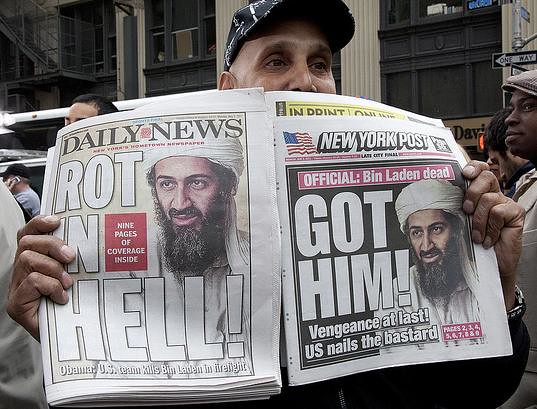
Wikileaks noted that information suggesting Bin Laden’s location had appeared in the Gitmo Files. The detainee assessment report for detainee Abu al-Libi stated that he moved his family to Abbottabad in mid-2003 after receiving a letter from Osama Bin Laden "requesting detainee take on the responsibility of collecting donations, organizing travel, and distributing funds to families in Pakistan."
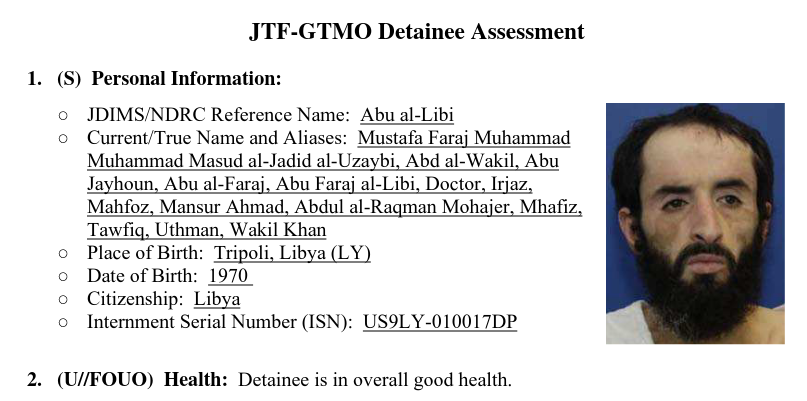
Bin Laden’s compound was just 1.3 kilometres from a Pakistan military training academy. WikiLeaks cables showed that the UK military had stationed Chinook helicopters at the Abbottabad base to help train Pakistan’s special forces in the fight against extremism.
Pakistan leaders denied giving refuge to Bin Laden, pointing to WikiLeaks cables which showed they "repeatedly told the US that while they wanted to help find the terrorist, they didn’t know where he was". US officials did not trust Pakistan government assurances, and apparently did not trust the information they extracted from Guantánamo Bay prisoners either. So what was the point of the torture?

Juice Rap News ridiculed the many conflicting media reports about the US military’s capture and killing of Bin Laden. Four years later, veteran investigative journalist Sy Hersh investigated the USA’s official history of the Bin Laden killing and found it remained full of holes.
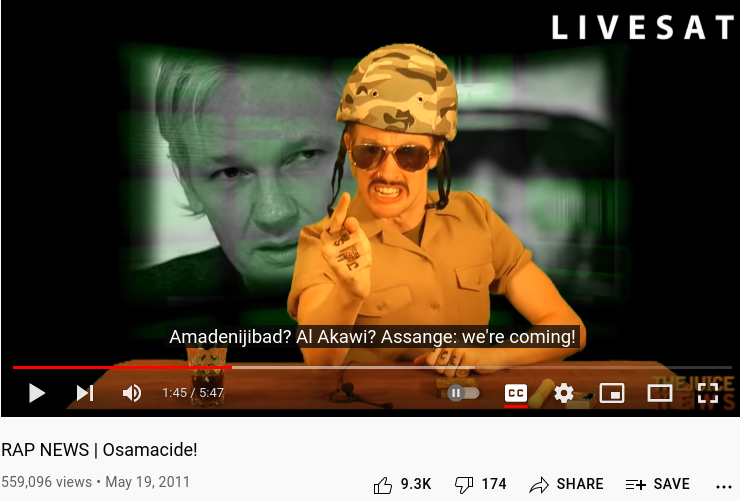
You can't spell "justice" without the "US" And it's called justice because it's just US that's justified In judging just cause, just wars and just evidence - Just test this justice and get iced if you mess with us.
*
On the same day Bin Laden was killed, Russia Today published a wide-ranging interview with Julian Assange, who said Guantánamo Bay was set up to hide people and to "keep them outside of the law". He accused the US government of "people laundering":
"The Obama administration says that 48 of those people still in Guantanamo are completely innocent and they should be sent somewhere, and they are not being sent anywhere."
Asked about the continuing release of cables, Assange pointed out that the many shocking revelations from WikiLeaks were just the tip of a giant, hidden iceberg:
"We only released secret, classified, confidential material. We didn’t have any top secret cables. The really embarrassing stuff, the really serious stuff wasn’t in our collection to release. But it is still out there.”
Asked about "cable cooking" - a common complaint from readers whereby media organisations over-redacted cables to protect businesses and others who deserved to be exposed - Assange was furious:
"The New York Times redacted a 62-page cable down to two paragraphs. And this is completely against the agreement that we originally set up with them on November 1, 2010. That agreement was that the only redactions that should take place are to protect people’s lives. There should be no other redaction, not to protect reputation, not to protect The Guardian’s profits, but only to protect lives."
"What happens in the West is that there is no border between state interest and commercial interest. The edges of the state, as a result of privatization, are fuzzed and blurred out into the edges of companies. So, when you look at how The Guardian behaves, or how The New York Times behaves, it is part of that mesh of corporate and state interests seamlessly blurring into each other."
The 39-year-old Australian cited US social media giants as a prime example of this dangerous inter-meshing of corporate and government functions:
Facebook in particular is the most appalling spying machine that has ever been invented. Here we have the world’s most comprehensive database about people, their relationships, their names, their addresses, their locations and the communications with each other, their relatives, all sitting within the United States, all accessible to US intelligence. Facebook, Google, Yahoo – all these major US organizations have built-in interfaces for US intelligence. It’s not a matter of serving a subpoena. They have an interface that they have developed for US intelligence to use… Everyone should understand that when they add their friends to Facebook, they are doing free work for United States intelligence agencies in building this database for them.
After discussing the roles of Sweden, Britain and the USA in his extradition case, the WikiLeaks founder was asked who he thought was his biggest enemy?
Our No. 1 enemy is ignorance. And I believe that is the No. 1 enemy for everyone – it’s not understanding what actually is going on in the world. It’s only when you start to understand that you can make effective decisions and effective plans. Now, the question is, who is promoting ignorance? Well, those organizations that try to keep things secret, and those organizations which distort true information to make it false or misrepresentative. In this latter category, it is bad media. It really is my opinion that media in general are so bad that we have to question whether the world wouldn’t be better off without them altogether. They are so distortive to how the world actually is that the result is… we see wars, and we see corrupt governments continue on. One of the hopeful things that I’ve discovered is that nearly every war that has started in the past 50 years has been a result of media lies. The media could’ve stopped it if they had searched deep enough; if they hadn’t reprinted government propaganda they could’ve stopped it. But what does that mean? Well, that means that basically populations don’t like wars, and populations have to be fooled into wars. Populations don’t willingly, with open eyes, go into a war. So if we have a good media environment, then we also have a peaceful environment.
*
A national election was held in Canada on 2 May 2011. Throughout April and May WikiLeaks released numerous US cables about Canada. Some voters reported receiving robocalls telling them it was illegal to read WikiLeaks information.
A topical issue was Canadian citizen Omar Khadr, who had been sent to Guantánamo Bay at the age of just fifteen, after being tortured at Bagram Air Base in Afghanistan, and spent ten years in US custody. WikiLeaks cables showed that the Canadian government decided not to seek Omar Khadr’s repatriation at least partly because the graphic violence of his 2002 arrest and torture would lead to "knee-jerk anti-Americanism" and "paroxysms of moral outrage, a Canadian specialty". WikiLeaks Central compiled graphic (warning) evidence of his brutal arrest: finding his body face-down and immobile in a pile of rubble, US soldiers stood on top of him and fired two shots through his back.
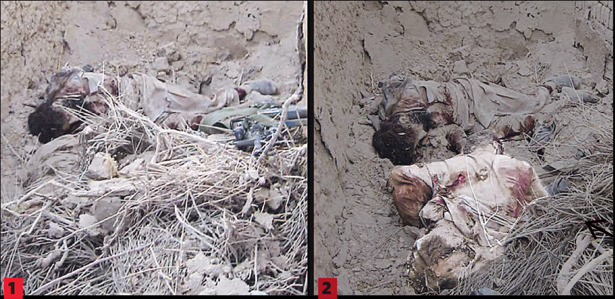
Khadr’s Gitmo File confirmed that in 2003 the US military still considered him a "high risk enemy combatant" who was "increasingly hostile to his interrogators". Khadr returned to Canada in 2012 and was later paid $10.5 million compensation by the Canadian government. Analysis of WikiLeaks documents proved that at least fifteen juveniles had been brought to Guantánamo Bay.
“This is three more than the 12 the State Department acknowledged to the public after our earlier report on the subject, and seven more than the eight the State Department originally reported to the United Nations Committee on the Rights of the Child."
Andy Worthington later provided evidence that the true number could have been up to 28 child detainees.

In May 2011 WikiLeaks begain releasing US cables about Japan with media partner Asahi Shimbun. Japanese citizens had long been demanding the closure of a major US military base in Okinawa, but the USA was only prepared to relocate it to a nearby site. WikiLeaks cables exposed the public posturing of Japanese officials:
Japanese government officials were never committed to relocating the U.S. Marine Corps Air Station Futenma outside of Okinawa Prefecture…. But they also secretly said that, in the end, Japan would go along with the 2006 agreement if the United States rejected the proposed alternatives.
WikiLeaks cables showed that the USA argued they could not move their air base in Okinawa because of the ""military threat from China". Officials also deliberately inflated the costs of moving the base.
*
Another nation taking a keen interest in WikiLeaks was the small South American nation of Ecuador. Socialist President Rafael Correa was keen to know what US officials had been saying about Ecuador before and after he came to power in 2007 and shut down the US military base in Manta. Diplomat Fidel Narvaez made first contact with Julian Assange. Rather than demanding WikiLeaks withhold sensitive US cables, they insisted that everything should be published.
I personally approached him in 2011, because my government was interested in making public all the diplomatic cables on Ecuador. We were not looking for privileged access to the cables, but we did want them available in the public domain. To that end, in May 2011, Wikileaks released all those documents — and with no strings attached.
There were immediate repercussions:
When WikiLeaks cables brought to light one American ambassador’s interference in Ecuadorian internal affairs, she was subsequently expelled. We also expelled several CIA agents, because they were interfering with our police forces.
*
Meanwhile, Rupert Murdoch’s Wall Street Journal paid WikiLeaks the ultimate compliment by launching their own copycat "secure" anonymous online dropbox named SafeHouse (spoiler: it was a ridiculous failure and no longer exists).
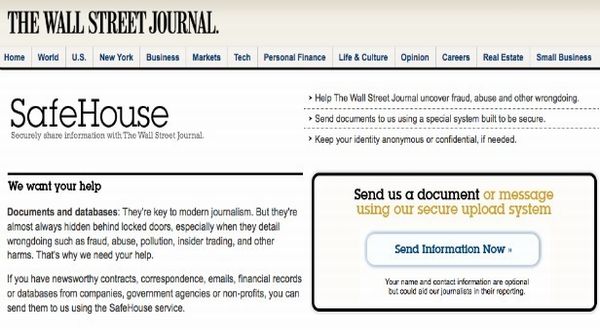
They warned that while anonymity was optional, contact information was "strongly encouraged". The terms and conditions included a disclaimer that the site "cannot ensure complete anonymity" of whistleblowers and recommends "cloaking" tools such as Tor. But security specialists who tested the site using Tor could not manage to upload documents. The WSJ terms and conditions also stated that the site owners "reserve the right to disclose any information about you to law enforcement authorities or to a requesting third party, without notice, in order to comply with any applicable laws and/or requests under legal process".

WikiLeaks ridiculed the idea that a corporate newspaper could launch such a site while simultaneously demanding the indictment of Julian Assange. They pointed to Assange’s previous comments about mainstream journalists lacking the technical knowledge to protect online sources, and also lacking the courage to protect whistle-blowers.
*
Media attacks kept coming. Even the USA’s non-profit Public Broadcasting Service (PBS) took aim at WikiLeaks, with a Frontline documentatry titled "WikiSecrets". The primetime TV show featured hostile quotes from figures like Daniel Domscheit-Berg, Adrian Lamo, David Leigh, and the New York Time’s Bill Keller and Eric Schmitt.
Hours before the program went to air on 24 May 2011, WikiLeaks released a full transcript of the "behind the scenes interview tape between Julian Assange & PBS Frontline’s Martin Smith". This was followed by "correspondence between PBS and WikiLeaks as to the ethics of this interview".
A source within PBS told us that Frontline would attempt to embroil Julian Assange and Bradley Manning in an espionage context. Frontline assured us this was not what the documentary would show and that the two men’s stories would not be connected.
The show included a quote from Eric Schmitt speculating on a possible intermediary between Assange and Manning, with producers suggesting that person could be "a member of the Boston community… subpoenaed by the Grand Jury" (i.e. David House: see below). WikiLeaks Central noted that the documentary "overplayed Manning’s homosexuality" and Assange didn’t get ample time to speak: "the problem is that every time he was asked a question it was about a criticism, which forced him to be on the defensive." Sympathetic figures like Vaughan Smith, who were also interviewed for the sure, were edited out.
Greg Mitchell from The Nation later described the program as "nothing but re-hash" of news reports going back to June 2010:
"One of the only bits of new information in the much-ballyhooded PBS Frontline program on WikiLeaks, Assange and Bradley Manning which aired tonight was: the man who fingered Manning, Adrian Lamo, secluded in California, has a large goldfish in his apartment."
After the program finished, angry hackers defaced the PBS website, posting a fake story that dead rapper Tupac had been found alive and well in a small resort in New Zealand, living with another dead rapper, Biggie Smalls. Thousands liked the story on Facebook while Twitter users began eagerly speculating if it could be true. The hackers also posted a list of usernames and passwords for PBS I.T. admins and users, along with login details for local PBS television stations.

*
On 2 June 2011 WikiLeaks founder Julian Assange was awarded the prestigious Martha Gellhorn Prize for Journalism. The prize is awarded annually to a journalist whose work has "penetrated the established version of events and told and unpalatable truth that exposes establishment propaganda, or 'official drivel', as Martha Gellhorn called it."
Martha Gellhorn, who died in 1998 and was briefly married to Ernest Hemingway, spent sixty years covering US global conflicts.
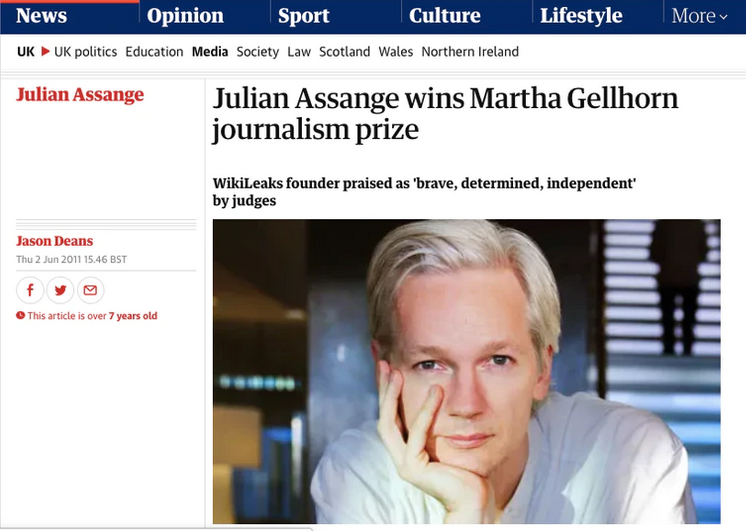
The judges voted unanimously for Assange, claiming that he "represents that which journalists once prided themselves".
"WikiLeaks has been portrayed as a phenomenon of the hi-tech age, which it is. But it’s much more. Its goal of justice through transparency is in the oldest and finest tradition of journalism.
"WikiLeaks has given the public more scoops than most journalists can imagine: a truth-telling that has empowered people all over the world.
"As publisher and editor, Julian Assange represents that which journalists once prided themselves in – he’s brave, determined, independent: a true agent of people not of power."
On the same day, New York Times editor Bill Keller resigned, claiming he wanted to become a full time writer. Bill Keller had been a leading supporter of the 2003 invasion of Iraq, who defended New York Times journalist Judy Miller’s fake news stories about Iraq WMDs, and called arch Neocon Paul Wolfowitz a "sunshine warrior". WikiLeaks ridiculed his literary aspirations:

The very next day, Keller published an article titled "A Theory of Conspiracy Theories" in the New York Times, citing Assange as an example.
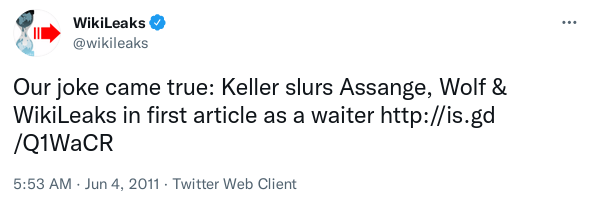
*
On 15 June 2011, David House, the co-founder of the "Bradley Manning Support Network", appeared before the WikiLeaks Grand Jury in Alexandria, Virginia. House, who had previously been harassed by US government agents after visiting Manning three times at Quantico, invoked the Fifth Amendment and refused to testify. He later released a statement demanding the Department of Justice’s cease their "politically motivated harassment".
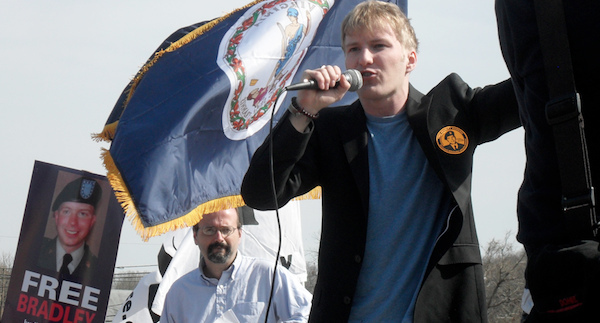
The show trial that is now underway in Alexandria VA has the potential to set a dangerous precedent for regulating the media. Using Nixonian fear tactics that were honed during the Pentagon Papers investigation, the DoJ is attempting to dismantle a major media organization - WikiLeaks — and indict its editor, Julian Assange. The DoJ’s ever-widening net has now come to encompass academics, students, and journalists in the Cambridge area.
House said the Obama administration was trying to force him and other individuals to testify against WikiLeaks in order to criminalise its publications. Supporters in the Greater Boston area were being asked "Do you or have you ever worked for WikiLeaks?" - a chilling reminder of the McCarthyist anti-Communist hysteria.
WikiLeaks noted that there were only two other federal Grand Juries active in the USA; one investigating the #Anonymous “hacktivist” group, the other targeting antiwar, labor and international solidarity activists. NPR’s Carrie Johnson said the WikiLeaks Grand Jury was "part of a much broader campaign by the Obama administration to crack down on leakers".
"National security experts say they can’t remember a time when the Justice Department has pursued so many criminal cases based on leaks of government secrets… Aside from the ongoing WikiLeaks investigation, federal prosecutors have brought criminal charges against four other people, including former State Department employee Stephen Kim; former CIA operative Jeffrey Sterling; one-time National Security Agency analyst Thomas Drake, who is going to trial next month in Baltimore; and former FBI translator Shamai Leibowitz, who pleaded guilty and was sentenced to almost two years in prison."
LulzSec

The day after the Grand Jury questioned David House, a group of online activists brought down the CIA’s website. The #LulzSec group had aleady ammassed 150,000 followers on Twitter after previously bringing down the US Senate, FBI affiliate Infraguard, numerous international Sony sites, US media company PBS (see above), Nintendo and several other video games companies.

In many of the attacks, including on Bethesda, the US Senate and pornography website pron.com, LulzSec also released sensitive data online such as the usernames and passwords of users. These lists even revealed that people with White House email addresses had signed up to watch porn.
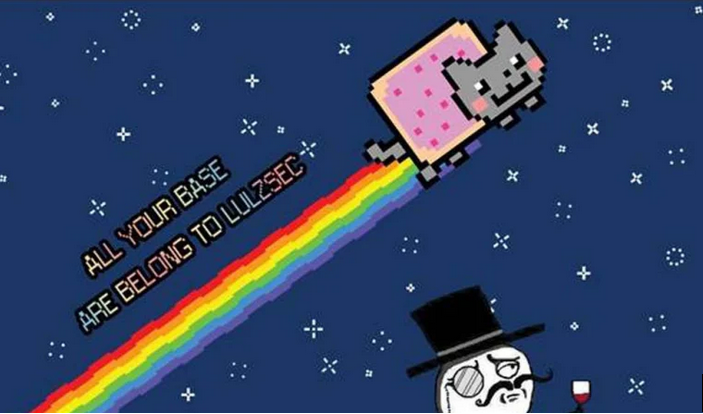
Supporters revelled in the outspoken hacktivists' humourous and headline-grabbing protests. Nobody knew that the group’s de-facto "leader" Hector Monsegur (aka "Sabu") had been arrested by the FBI a week earlier on 7 June 2011. With Monsegur now actively working as an FBI partner and informant, it was effectively the FBI who had just brought down the CIA’s website. The FBI even provided its own servers to support the hacking.
LulzSec had first "declared war" on 4 June with a pastebin statement for Operation Anti-Security (#AntiSec) which sought help targeting "the government and whitehat security terrorists across the world":
Top priority is to steal and leak any classified government information, including email spools and documentation. Prime targets are banks and other high-ranking establishments. If they try to censor our progress, we will obliterate the censor with cannonfire anointed with lizard blood. It’s now or never. Come aboard, we’re expecting you…
Just three weeks later, on June 25th, LulzSec declared their 50 day "cruise" was ended and "it’s time to say bon voyage".
Thank you for sailing with us. The breeze is fresh and the sun is setting, so now we head for the horizon.
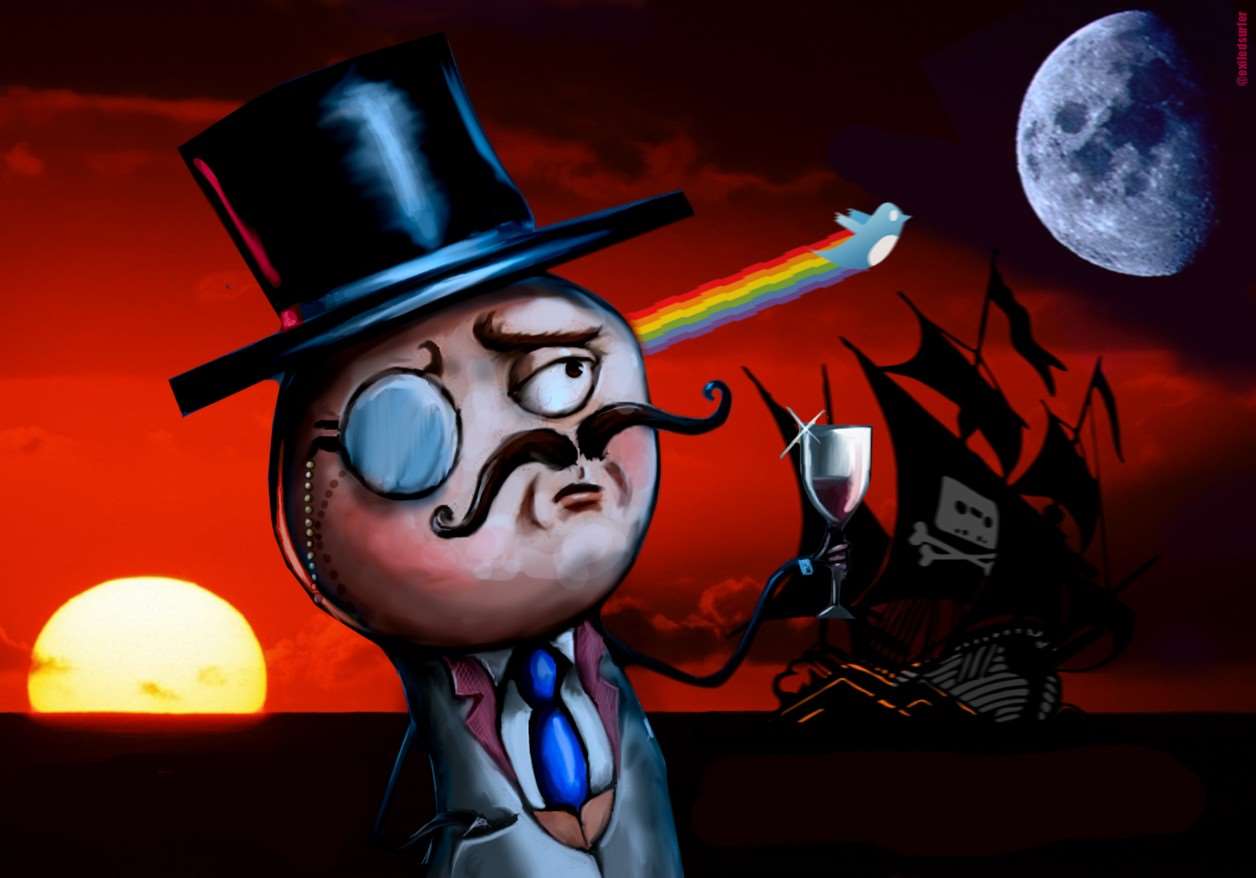
Nevertheless, the attacks and threats continued. On 11 July, the day before the Assange case was due be heard at the Royal Courts of Justice, Sabu’s FBI-controlled account warned:
ATTN: Tomorrow will be two of the biggest releases for Anonymous in the last 4 years. Everyone brace. This is literally explosive. #antisec
ATTN Intelligence community: Your contractors have failed you. Tomorrow is the beginning. #ANONYMOUS #ANTISEC
The Guardian, who a week earlier had published "leaked" LulzSec group IRC chat logs, quoted Anonymous hackers warning that 12 July would be "the biggest day in Anonymous’s history". They said "several top-level members of Anonymous are eager to launch attacks based around Julian Assange’s appeal hearing".
The collective is understood to be seeking to express anger over News International’s phone hacking and at the threatened extradition of WikiLeaks founder Julian Assange.
WikiLeaks accused the Guardian of "spinning a story" to prejudice the judges. Rather than targeting UK police or courts on 12 July, Anonymous hacked into US agricultural giant Monsanto instead. A day earlier #AntiSec hackers had released 90,000 email accounts and passwords from US defense contractor Booz Allen Hamilton, who insisted that government and military information remained secure.
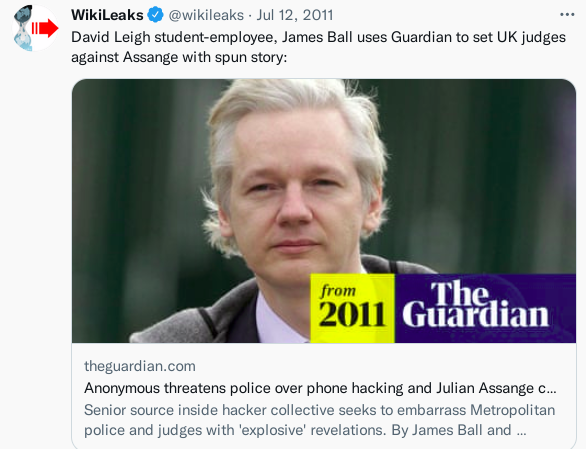
On 18 July LulzSec posted a story on Rupert Murdoch’s "The Sun" website, declaring that the media mogul was dead. Murdoch was "said to have ingested a large quantity of palladium before stumbling into his famous topiary garden". The Sun’s website was later redirected to the @LulzSec Twitter feed. This followed new revelations in the News Of The World phone-hacking scandal and the death of whistle-blower Sean Hoare.
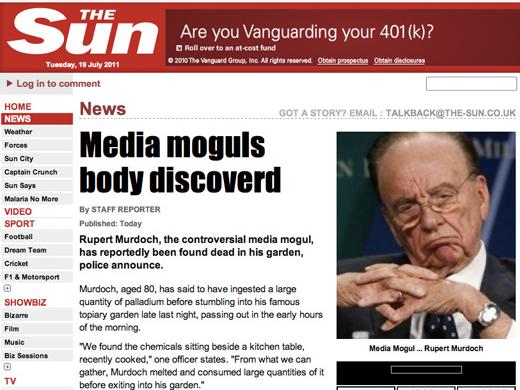
Meanwhile the FBI and foreign police forces had been busy arresting anyone connected with the attacks. Many were just teenagers. Chicago activist Jeremy Hammond, who was also accused of involvement in the hacking of Stratfor, received a ten-year prison sentence; he was later summoned by the WikiLeaks Grand Jury, where he refused to testify. Hector Monsegur was rewarded for his collaboration with an early release from prison in May 2014.
*
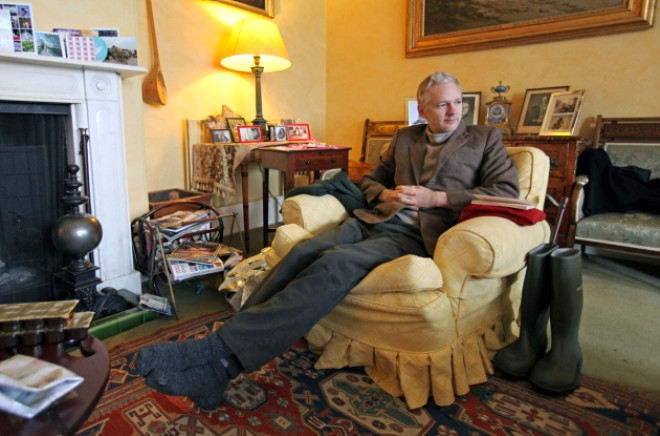
On 3 July 2011, Julian Assange celebrated his 40th birthday with a large gathering of friends and supporters at Elligham Hall. The WikiLeaks Editor-In-Chief, who was still wearing an ankle bracelet that tracked his every movement, including his daily trips to the local police station, had now been under house arrest for over six months. By this time, US intelligence officials were secretly plotting to designate WikiLeaks as “a ‘malicious foreign actor’ for the purpose of targeting.” This would allow them to target WikiLeaks and associates - including US citizens - with extensive electronic surveillance.
As a tongue-in-cheeck publicity stunt, and in the hope of garnering more high profile supporters, Assange sent birthday invitations (complete with directions for private jets and helicopters) to Hollywood celebrities like Brad Pitt and Angelina Jolie. Former UK Ambassador Craig Murray, who became a close friend of Julian’s, was not impressed:
"I hope when Assange’s celebrity dies down, those helicopter riders will still support him. I doubt it."
In fact they never even responded. The party featured an auction of donations to raise funds for Assange’s legal expenses, with personal bids establishing a reserve price before items went on Ebay. A week earlier, UK media had reported that a $1.5 million deal for Assange’s biography had fallen through, and WikiLeaks donations were being funneled into the Julian Assange Defense Fund.
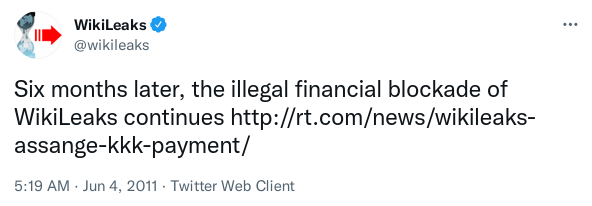

A week later, Assange’s lawyers launched a fresh appeal against his extradition at the High Court in London. At his first appeal to the Westminster Magistrates Court in February, the judge had dismissed claims that he would not get a fair trial in Sweden, and that the extradition attempt was politically motivated. When Assange again lost this expensive appeal to the High Court, after four months of deliberation, his last British legal resort would be an even more expensive appeal to the UK’s Supreme Court.
Beyond that, his final avenue of appeal would be to the European courts, where his legal team remained optimistic; many supportive European MPs had already condemned Sweden’s abuse of the "imperfect" European Arrest Warrant processes.
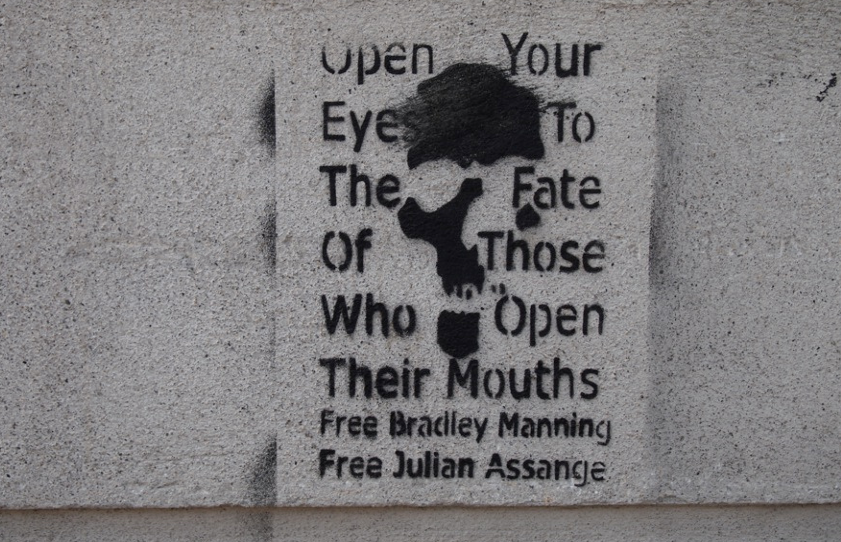
*
*
The author of this book can be found on Twitter: @Jaraparilla
*
Home - Genesis - 2007 - 2008 - 2009 - Early 2010 - Mid 2010 - Late 2010 - End 2010 - Early 2011 - Mid 2011 - Late 2011 - End 2011 - Early 2012 - Late 2012 - Early 2013- Late 2013 - 2014 - 2015 - Early 2016 - Late 2016 - 2017-19
Copyright Gary Lord 2021, 2022, 2023